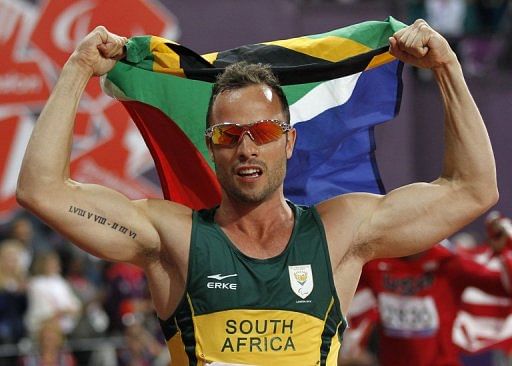
Pistorius dope-tested twice at Paralympics
PARIS (AFP) –

South Africa’s Oscar Pistorius celebrates winning gold in the men’s 400m T44 final at the London 2012 Paralympic Games on September 8, 2012. Pistorius was drug-tested before and during last year’s Paralympic Games in London, the International Paralympic Committee (IPC) said on Wednesday, adding that on both occasions the results were negative.
Oscar Pistorius was drug-tested before and during last year’s Paralympic Games in London, the International Paralympic Committee (IPC) said on Wednesday, adding that on both occasions the results were negative.
“Oscar was tested twice in London. First on 25th Aug in an out of comp (competition) test and then also 8th Sept in an in comp test. Both negative,” IPC director of media and communications Craig Spence said in emailed comments to AFP.
“He’ll also have been tested by IAAF (International Association of Athletics Federations) and South African anti doping agency last year,” he added.
The details came after police investigating the death of Pistorius’ girlfriend, Reeva Steenkamp, at his home last week told a court in Pretoria that they found testosterone and needles in his bedroom.
Pistorius, who made history last year by becoming the first double-amputee to run in the Olympics, is accused of deliberately gunning down Steenkamp on Valentine’s Day, February 14.
The first drug test in London was four days before the Games opened while the second would have been after he retained his T44 400m title for single and double below-the-knee amputee sprinters on the last full day of competition.
But he appears not to have been tested after winning silver in the 200m race or after coming fourth in the blue riband 100m event.
Drug-testing came under the spotlight at the Paralympics after organisers said that unlike at the Olympics that preceded it, they would not drug-test every medal winner.
The president of the IPC’s anti-doping committee, Jose Antonio Pascual, said at the time that analysing samples from every medallist would be impossible, as there were 503 golds on offer compared with about 300 at the Olympics.
Pascual insisted, though, that at least one medallist would be tested, alongside random testing of other competitors, which he maintained was a strong enough deterrent to prevent doping violations.
The IPC has its own anti-doping code, which adheres to the general principles of the World Anti-Doping Code and applies to all athletes both in and out of competition.
The list of prohibited substances is the same as for non-disabled athletes.
Pistorius’ lawyer, Barry Roux, told the court that the substance found was a herbal remedy and he was authorised to use it.
AFP asked the IPC whether Pistorius had registered for an exemption of any substance for therapeutic use. The organisation said: “That is confidential information that we cannot release.”
The International Olympic Committee said they did not test Pistorius during the Olympics and as a result did not have his samples.
“The IOC conducted more than 5,000 tests in London, including all top five finishers and two other athletes selected at random from each event,” they said in a statement.
“Oscar Pistorius finished 23rd in the 400m and 8th in the 4x400m with team South Africa at London 2012.